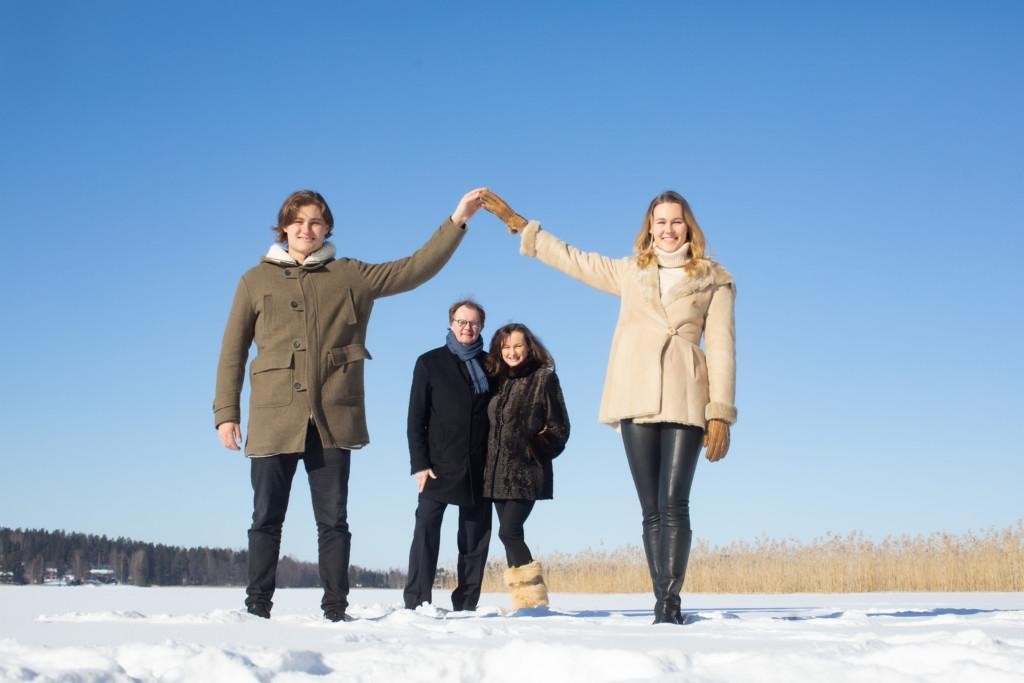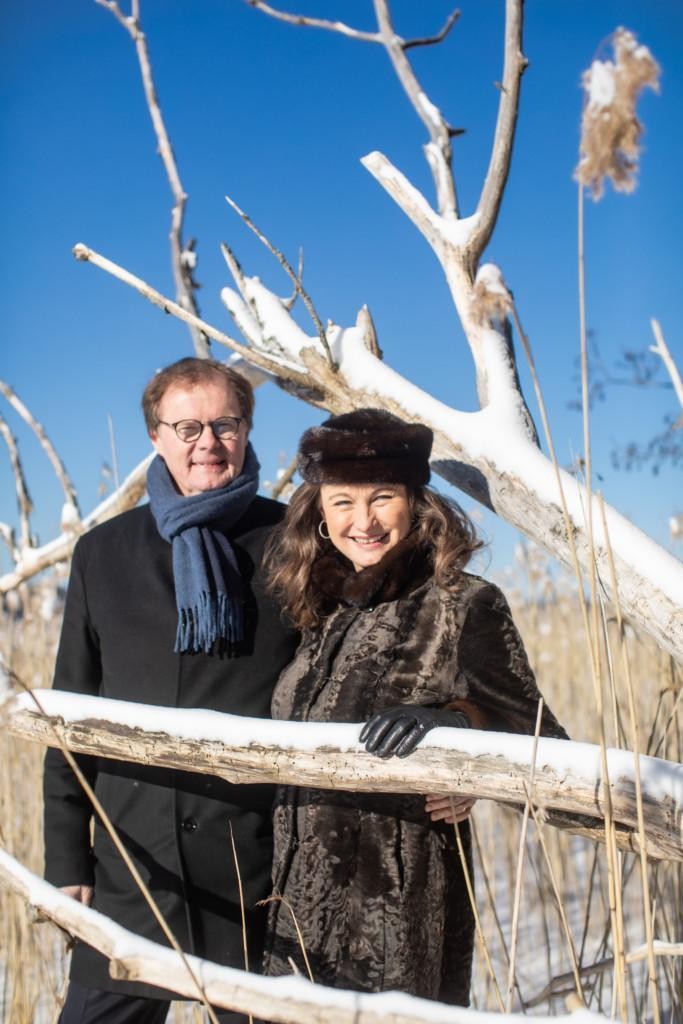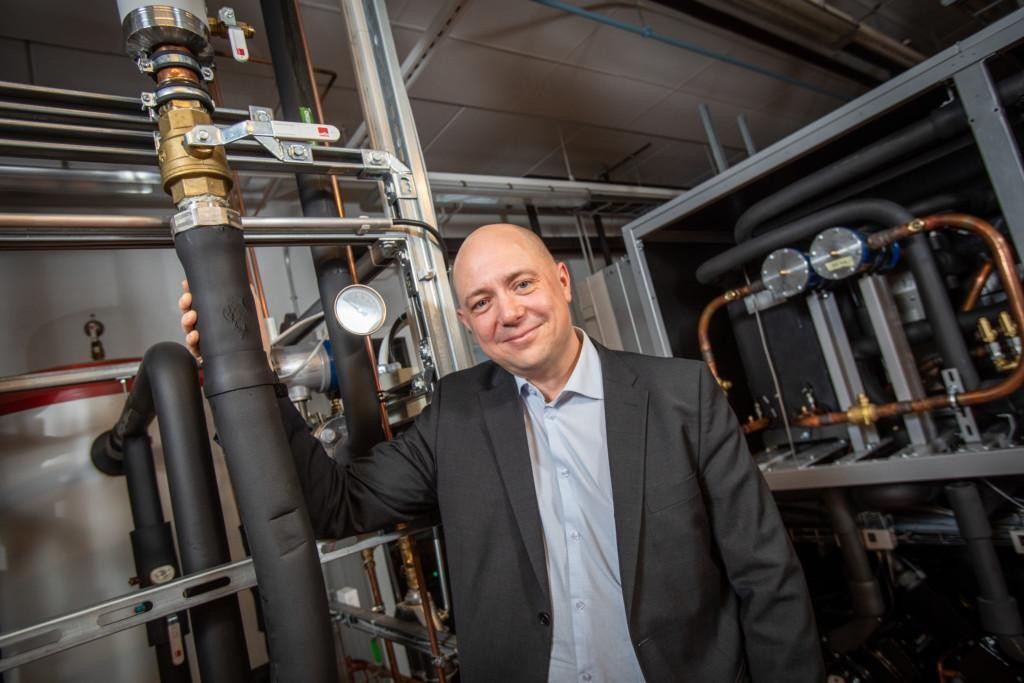
Oilon, a pioneer in clean energy technology, is gearing up for rapid growth. A human approach brings meaning to life and work, say the leaders of the family business.
Hard work and love. Everyone deserves a job they like or even love. The success of Oilon is based on this simple philosophy, says Päivi Leiwo, Vice Chairman of the Board.
“I’m serious. Life’s ups and downs have made me realise that a loving attitude is the only thing that matters in the end. I learned this from my mother.”
Päivi Leiwo was ten when her family acquired Oilon in its entirety. Ever since she has closely followed the family business.
According to Päivi, love is the basis for building not only personal wellbeing but also the wellbeing of the entire work community. It has a great deal to do with corporate social responsibility and ethics. Päivi believes that it is important to be a part of creating that kind of organisational culture and, indeed, that kind of world.
It’s no accident that the slogan of the family business has for a long time been Oilon – The warm way. The warmth comes from the heart.
A face is a competitive advantage
In the space of 60 years, Oilon has risen from a two-man startup in a garage to become a global trailblazer in clean energy technology with 370 employees on four continents. The group’s turnover in 2020 was approximately 70 million euros. Oilon’s combustion technology and heat pumps are known as some of the most advanced in the world. Over one million of their burners have been sold.
Within Oilon it has become apparent that a family business is more appealing in the customers’ eyes than a faceless giant company or one working in the shadow of venture capitalists. Many of Oilon’s customers are also family businesses.
“We work on an extremely long basis. We do not optimise our operations for the next quarter rather we think much further ahead”, says Kjell Forsén, a new member of the Oilon team.

Forsén joined Oilon as Chairman of the Board in Autumn 2020. Previously, he worked for many years as CEO at Vaisala, another family business.
Let’s open up these Oilon family connections now for the reader. The father-figure of the company, Ossi Leiwo, joined Oilon straight away in 1961. He rose to the position of CEO in 1974, and Oilon became a family company in the same year.
Ossi guided the company as CEO for 23 years and as Chairman of the Board for 35 years. After Ossi’s retirement in 2009, his daughter, Päivi, became Chairman of the Board. She led the board until 2020 when her husband, Kjell, took over.
The third generation is also involved: Päivi’s children, Mikael and Celia Svensk are new members of the board at Oilon. They are already familiar with the operations of the family business and have completed internships at Oilon premises abroad. Mikael and Celia are both students.

“A family business is a wonderful thing. It’s a joy and an honour to pass on this kind of cultural heritage to one’s children”, Päivi says.
Päivi got her first job at Oilon as a 14-year-old during winter holidays from school. She has worked full time at the company since she was 25.
Outsiders are always interested in how decision-making works when the majority of the board are members of the same family.
“We are always of the same opinion. I know it sounds unbelievable, but decisions are made in great harmony.”
This is how you keep a customer for 20 years
An uncompromising customer-oriented approach is emblematic of Oilon. In practice, it means that the customer’s requirements are understood in detail and their issues are quickly fixed.
“The difference between competitors is usually the decisive factor here: who gets the job done and who throws in the towel. The most loyal customers are those for whom we find the best solutions”, Kjell says.
Combustion technology and heat pump projects are usually complicated. In those cases the customer, sales, and production teams have to speak exactly the same language.
“It’s sometimes scary to think: have we really done absolutely everything possible to solve the customer’s problem”, Päivi says.
Clearly a lot has been done well. The 20-year customer relationships, for example, in India, China, Denmark, Russia and Singapore speak to that. They continue to this day.
The customer-oriented approach is under the magnifying glass also on CEO, Tero Tulokas’, desk. He is currently leading a project to develop customer experience.

“We monitor many things: how easily can we be found, how quickly do we respond, what is the quality of the responses, how long do we spend at the customer’s premises, and so on. The data are collected systematically and are compared with our objectives.
Tero has a particularly good background for developing customer experience: he was himself previously an Oilon customer. Before joining Oilon in 2008 he worked as the CEO of Hamina Energy where he bought burners for district heating plants from Oilon. Tero worked on these projects overseeing the work, and therefore became familiar with both the technology and how the equipment works.
“I was part of the team that commissioned the first Oilon burner back when I was 7 years old. My dad was in charge of the building services in the armed forces, and I went with him. The dual burner in question was installed in the garrison’s heating installation. It is still in use.” Tero says.
During difficult years we invest in development
Another ace up our sleeve is without doubt product development. This is thanks to Ossi who was responsible for the technology in the early days of the company. Long-term CEO, Eero Pekkola (1997 – 2017), who followed Ossi, also focused heavily on product development. It is no coincidence that the current CEO also works as the head of product development.
During the past year of COVID-19, Oilon increased its product development budget by over 10 percent, even though the pandemic increased costs and there were challenges with sales.
“Oilon has always worked on the principle that even during difficult times we invest in developing our products. Making savings in that area would be like sawing the branch you are sitting on”, Tero says.
Product development is important also during good years. Even though the classic Oilon Junior designed for small houses sold exceptionally well in its time, Ossi saw that it wouldn’t last forever. That’s why it’s important to have a finger in many different pies. Now, the Oilon Junior accounts for 3 percent of sales. At its height it accounted for 80 percent.
As of 2021, Oilon’s portfolio includes hundreds of burners whose power output ranges from 10 kilowatts to over 90 megawatts. The scale of industrial heat pumps reaches from 100 kilowatts to as much as 50 megawatt systems. Their delivery includes automation and control systems.
In addition, Oilon produces ground source heat pumps and their accompanying boilers and ventilation technology designed for real estate properties. Altogether the components and spare parts make up over 10 000 warehouse pieces. Oilon has factories in Finland, USA, Russia, and China. The company also services its own products.
At the moment, product development is focused on reducing emissions.
“The emissions goals and regulations of our customers are being tightened all the time. The world needs cleantech and we have to be along for that ride. This is a large part of Oilon’s added value.” Kjell says.
Thanks to product development, Oilon’s heat pumps can magically produce 100-degree district heating from sub-zero air. There are not many who can match that.
Climate change can be stopped
Climate warming is a megatrend that has increased the demand for Oilon’s technology around the globe. Coal is being replaced by natural gas, and new advanced gas burners are needed. Sales of burners increases the need to minimise particles, nitrogen oxides and other local air pollutants. The biggest growth in burners is expected in the Low-NOx range.
The goals of states and energy companies to reduce carbon dioxide emissions is fuelling the demand for large heat pumps. For example, high-temperature heat pumps connected to district heating directly reduce the amount of coal needed. Industrial plants are looking for sensible solutions for heating and cooling, and thus reducing their carbon footprint.
“Hopefully, societies will wake up and start to slow climate warming. The solutions are within reach if we decide to take them into use. Vehicle emissions could easily be more than halved if top speeds and road speed limits were reduced. Together, technology and regulations could work wonders.” Tero says.
The climate theme is also familiar to him from discussions with his own teenaged children. Dad has to think carefully about what he says.
“When I was young, I was worried about acid rain. That problem was solved. When confronted with big challenges we need positivity and optimism. That’s an important message for youngsters.”
90 percent growth in one year
Growth has always been a part of Oilon’s story, and that trend continues. Sales of industrial heat pumps have grown by as much as 90 percent a year over the past two years. The production facilities in Kokkola are being quadrupled in size.
A good example of this new type of demand is a project in northeast China announced in February 2021. Oilon will deliver eight ChillHeat heat pumps to China’s largest battery park in the city of Dalian. The battery park stores electricity, which helps wind energy integration into the Liaoning province’s network. Oilon’s heat pumps capture the waste heat produced by the batteries and transfer it to the district heating network.
“This is a great project and speaks of the benefits of heat pumps in many industrial processes. Of course, it is also fantastic to be part of a project increasing renewable energy in China.”, Tero says.
China is almost like a second home to Oilon. They have been selling burners there for 30 years, and its factory has operated in the city of Wux for 20 years. Oilon’s burners have cleaned chiefly the air in the capital city, Peking.
Oilon is now establishing a strong foothold in the large heat pump market in China. There are also signs of growth in Central Europe and North America.
TEXT Jussi Laitinen
IMAGES Juho Paavola
TRANSLATION Robert Brooks
